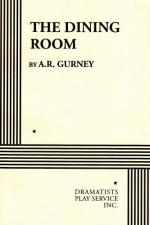|
This section contains 337 words (approx. 2 pages at 300 words per page) |

|
[The Dining Room] dramatizes the domestic crises that usually afflict families during lunch and dinner. The problem is that neither the crises nor the families are particularly interesting; the play seems more an exercise in WASP sociology than an act of theatrical imagination.
To be fair, the playwright is less interested in dramatic confrontations than in depicting, through a technique of kaleidoscopic time warps, the manners and morals of a dying aristocratic class. The play is full of convincing nostalgia for the passing of a decent old world, and tolerant resignation (less convincing) over what is coming to replace it. "Some Irish fellow or Jewish gentleman will be sitting in that chair—and your grandson will be back at the plough," remarks one crustacean before remembering to add, "and that won't be such a bad thing either." It is the noblesse oblige of Renoir's Grand Illusion, where the...
|
This section contains 337 words (approx. 2 pages at 300 words per page) |

|


